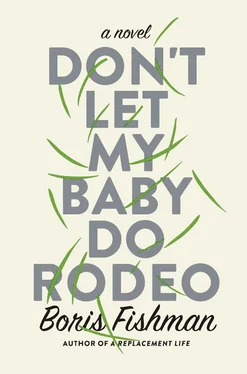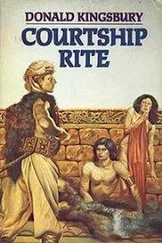“And I?” Maya said. “Do I deserve to see where my child was born? Does he?”
“Voices,” Raisa said. “Please. He’s upstairs.”
“We discussed this,” Alex answered his wife. “The parents is what we need.”
“What if they want him back?” Raisa said in a conciliatory tone. “Let’s say you find them. Have you considered that?”
“They can’t,” Alex said. “Legally, he’s no longer theirs.”
“And what, the law is everything?” Eugene piped in. “So they can’t have him back, but they can make our lives difficult. Eight years have passed, they’re living their quiet, dead lives out there wherever they are, and suddenly you call, stir things up, give them something to do. Just the excitement they need. Think about it. Think about Max finding out. Think about a difficult situation becoming difficult in a new way.”
“What do you propose, Papa?” Maya said, exploiting the endearment; she referred to Eugene paternally rarely. Eugene’s shoulders slumped in a new way and he looked out toward the backyard, simmering in the blue haze of dusk.
Maya watched Alex. She was being forced to surrender the solidarity she had felt from her husband in Gabe Mishkin’s home; it had been tactical, not strategic. Their aims had overlapped, but in the manner of allies who share an enemy rather than a purpose. Her chest filled with helplessness. She imagined water in her lungs, frothing and burbling as she tried to breathe; she felt waterlogged with misery. She wondered if, secretly, her husband wished to go, but merely feared responsibility for another error and needed her to insist on it — then dismissed the possibility as another fantasy of alliance.
“Alex, it can’t hurt for him to see it,” she said without energy. “If nothing else, he has a right to. He has a right to know where he was born.”
“But he won’t know he was born there,” Alex said. “Because we aren’t going to tell him.”
“Voices,” Raisa hissed.
Alex’s eyes narrowed at his wife. “You’ve been wanting to leave New Jersey for twenty years. It’s like a prison to you. You want to live somewhere else, go live somewhere else.”
“I want to live somewhere else with my family,” Maya said.
Eugene and Raisa sat like two Buddhas; they wished they had not been around for this part of the argument. You can’t unhear what you’ve heard.
After a long silence, Maya sat down again. Again, she wedged herself in without sliding the chair out from the table. Again, she spoke as if her parents-in-law weren’t there.
“Yes, I do want to know what it’s like out there,” she said quietly. “Twenty-five years in America — thirty-five for you — and to never have gone farther than Florida and Chicago. Aren’t you curious? Aren’t you dying of curiosity? Okay, we won’t tell Max — but you and I know. Don’t you want to see it the same way that Laurel wanted to see this?”
“I see you’ve been reading Bender’s book,” Alex said. His face was tight with embarrassment — to have been spoken to that way in front of his parents. “Okay,” he said with withering softness. He rose from his seat, walked to the stairs, and called for Max. They heard the door of a bedroom open upstairs. “Maxie?” his father called again. “Come down, please, okay?”
“What are you doing?” Maya said.
“‘You want,’ ‘I want,’” Alex mimicked as they listened to Max descend the carpeted stairs. “Let’s ask him directly.”
“Ask him what?” Max said, blinking twice and surveying the adults in the kitchen. He reached up and touched the side of his head gingerly. One of his Indian masks from Mexico was around his neck on its string. It was the one with the snakes coiling out of the red mouth.
“Max, why are you wearing that mask?” his mother said.
“I was playing,” he said.
“He wants to go to Mexico, not Montana,” his father said. “Remember, Maxie? Turtle stakeouts after dark? We’ll take pictures this year.”
“You can’t, it startles the babies,” Max said. He slipped the mask off his head and winced again when it grazed his temple.
“Max, honey, stop that,” Maya said sharply. “It’s long healed.”
Max’s hand fell from his head as if he’d touched a flame with his finger. Alex eyed his wife with the satisfaction of a winner before the contest has started.
“Max?” Alex said. “Mama wants to ask you something.” He nodded at his wife.
Startled, Maya cleared her throat. She tried to collect herself. “Maxie?” she said hoarsely.
Max raised his eyebrows.
“How would you like to go on vacation? Me, you, and Papa? Mama’s always staying behind because of the airplane, but mama wants to go somewhere with you. We’ll drive there. A road trip.”
“Uh-huh,” Max said. He looked up and blinked twice. Every time he did that, Maya had the same thought: He didn’t get that from us. And then she fought it. “But where?” he said.
“Montana,” Maya said. Eugene and Raisa stiffened, as if the word alone would reveal to Max everything that had been so diligently kept from him. “Do you know where that is?” Maya went on. “It’s beautiful. More stars than you’ll see here. And very different kinds of grass, too. Many more kinds, I think. We’ll be gone for my birthday. We can celebrate it out there. Isn’t that fun?”
“It’s Mama’s birthday soon!” Raisa clapped, remembering it. She was eager to remind everyone that the future harbored good things as well.
“But what about school?” Max said to his mother.
“You’ll miss school,” Maya said. “How would you like that?” Alex looked at her — an unfair move. But it wasn’t — Max liked school.
“For how long?” Max said suspiciously.
“We’ll decide together,” Maya said. “If we like it there, we’ll stay longer. If not, we’ll come back.”
“If we like it, we’ll stay there longer?” Alex interfered. He was done leaving the conversation to his wife. He looked at his son. “Do you want to go, Max?” he said. “We won’t go if you don’t want to.”
Maya shot him a betrayed look. “School can wait,” she jumped in. “Did you know that your father missed the first two months of third grade because he was busy making his way to America?” She looked up at Alex, who confirmed resentfully.
Max shrugged heavily, a little Eugene. (Why did Max demonstrate only distinctions from Maya but resemblances of the other Rubins?) “But that wasn’t vacation,” the boy said, pleasing his father. For someone who wished to commune with the wild, her son could be annoyingly pedantic, Maya thought. And from whom had he inherited this blessing?
“And this is,” Maya said quietly. “The three of us are going.”
Alex slapped the table: See? She was conscienceless, his wife. Without the answers she wanted, she would force the child.
But then Max touched his ears with his shoulders. “Okay,” he said. “Let’s go.” Some internal switch, mysterious to the Rubins, had been touched and the cloud of skepticism was gone from his face. The adults peered at him, not sure what to make of his acquiescence.
Maya walked to her son and embraced him. He let her. When Maya and Alex had fought as young people, Maya had her arms around Alex’s shoulders before the argument was over. Alex would cast her off: He wasn’t a robot to switch from anger to affection like that. But Max was different. Perhaps there was a trace of her in her son after all.
+
In the manner of a larger organism unable, to its own surprise, to fend off the negligible parasite that has beset it, the Rubins gave in to Montana, though, as the days passed, it became clear that they would go only if Maya took charge of the arrangements. Alex wandered in an itchy moroseness. Raisa banged around the kitchen, trying to memorize things and clucking her tongue in despair. She asked if Maya had all her recipes in one place.
Читать дальше












